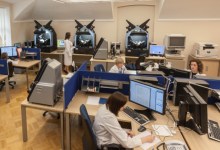
The Presidential Library Presents “Cultural Heritage Preservation” Film
On the eve of the All-Russian Day of Libraries and the 11th anniversary of the Presidential Library, which are celebrated on May 27, the Presidential Library provides the documentary film “Cultural Heritage Preservation”, dedicated to one of the pressing topics - preservation of cultural heritage in digital form. The film is available on the institution’s portal in “Audiovisual materials” section under the heading Documentaries. On May 28, the film will also be broadcasted live on the portal in Live broadcasts section at 15:00, 17:00, 19:00, 21:00 Moscow time.
The society has always sought to store and transmit information, gradually developing technologies for its storage. One way to extend the life of a document is to digitize it.
The materials digitized and created immediately in electronic form were also collected in electronic libraries. One of the nationwide electronic repositories of Russia has become the Presidential Library. The film shows the process of restoration of cultural monuments; gives a general idea of phase conservation; illustrates technology for information insurance.
It is very difficult to keep the original documents in their original form. Material carriers are destroyed over time due to environmental influences. Some storages, in order to preserve documents, resort to phase conservation - storing materials in microclimatic containers from acid-free cardboard.
To eliminate damage, it is necessary to carry out restoration of documents, which requires a lot of effort and time. “Cultural Heritage Preservation” film shows how, for example, in the National Library of Russia - at the Federal Center for the Preservation of Library Funds - various types of restoration are used: mechanized, manual and restoration of bindings.
However, all measures to protect important materials may be powerless before emergencies. The documentary tape contains footage of the fire that happened on February 14, 1988 in the Library of the Russian Academy of Sciences (at that time - the Library of the USSR Academy of Sciences in Leningrad). Then, thousands of important materials that did not have copies died by fire.
On January 30, 2015, the tragedy repeated in the library of the Institute of Scientific Information on Social Sciences of the Russian Academy of Sciences in Moscow. Fire destroyed several million publications.
It is possible to save valuable information from such disasters and extend the life of materials today by converting them into digital format. The very process, hidden from the eyes of the general public, in the Presidential Library, is shown in the film “Cultural Heritage Preservation”. Thanks to specialized scanning systems, the institution implements the digitization of materials of various formats from various source media. The film also shows the features of providing access to information resources. Those publications that previously could only be seen by a narrow circle of people, now, thanks to the digitization, can be studied.
The materials and documents of the Presidential Library are available in full in the electronic reading room of the institution and in the remote access centers, of which more than 1,000 are open today in Russia and abroad. Some of the materials are presented on the prlib.ru portal. Films, presentation videos, virtual exhibitions are also published on popular resources, shown at airports, airplanes, trains, public transport.
The Presidential Library’s collections have been formed since 2009 and are constantly updated. Today, more than 870 thousand electronic copies of book and periodicals, archival documents, audio and video recordings, photographs, educational films, dissertation abstracts have already been collected. About 1000 organizations and citizens are involved in the creation of a national electronic resource.
Thus, the systematic work of specialists and the continuous improvement of technological processes allow us to preserve the cultural heritage of our country and pass it on to future generations.





